#Mlle. Gillenormand
Text

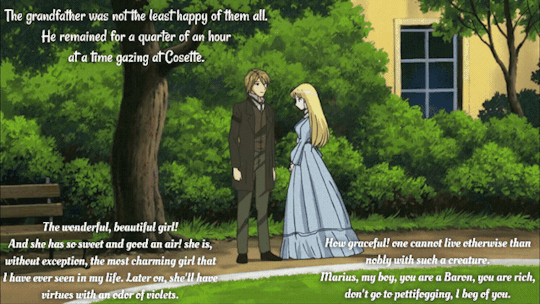
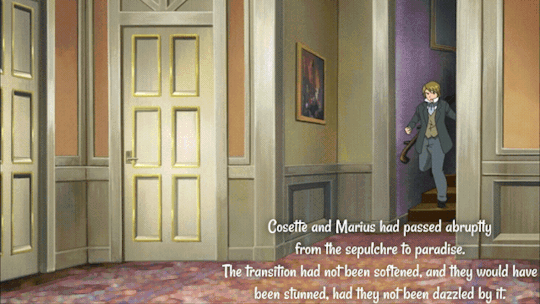
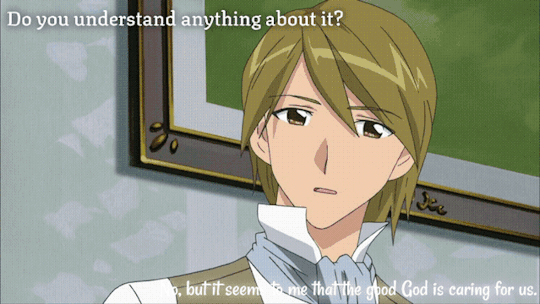
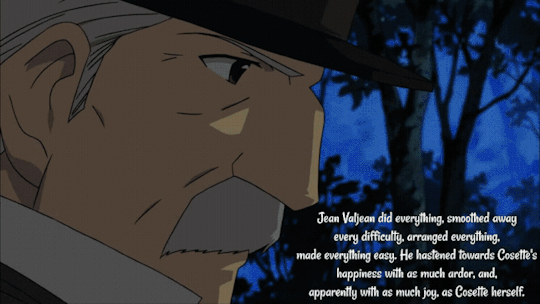
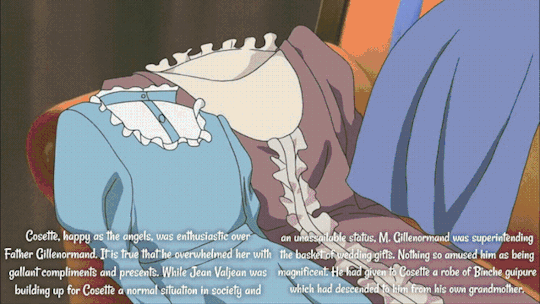
The Two Old Men(+One Young Man) Do Everything, Each One After His Own Fashion, to Render Cosette Happy, Volume 5, Book 5, Chapter 6.
Clips from <Il cuore di Cosette>.
#Les miserables#les mis#My Post#Cosette#The Lark#Mlle. Ursule#Marius#Lark and Booby#Gillenormand#Grandfather and grandson#Mlle. Gillenormand#Jean Valjean#M. Leblanc#Father and daughter#Owl and Wren#Cosette's Wedding#No matter what happens Cosette's Eternal Happiness is the reason why I read the Brick!#The Brick#Il cuore di Cosette#Les Mis Letters
26 notes
·
View notes
Text
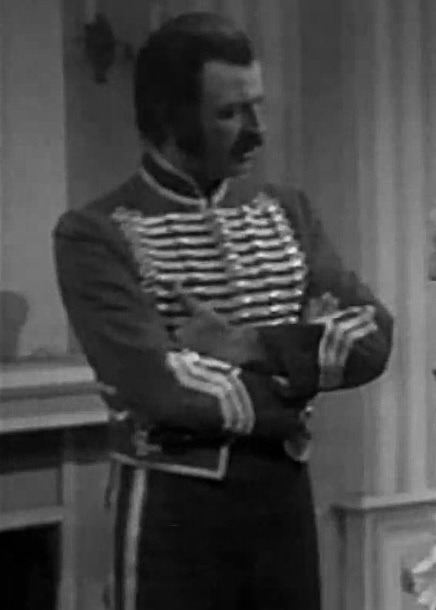
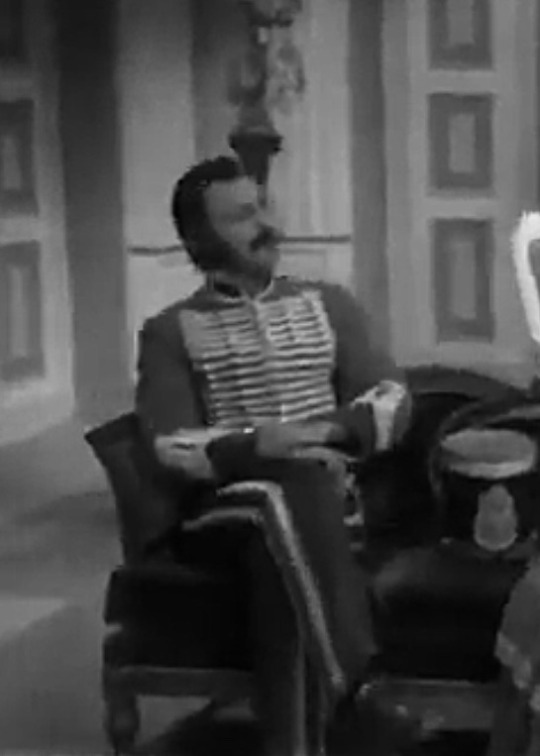
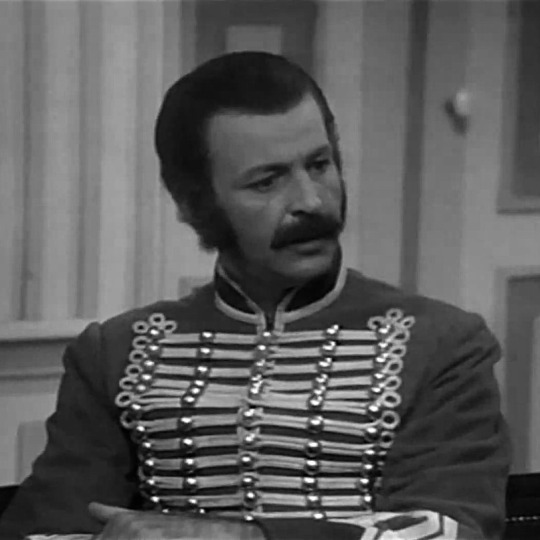

Les Misérables | Lebanese Series (1974)
Did you know that Theodule appeared in this wonderful adaptation??! If ur interested, He appears at the end of episode eight and the beginning of episode nine.
But his aunt doesn’t ask him to spy on Marius here. Theodule comes and the quarrel has already occurred between Marius and his grandfather, and his aunt tells him everything about the quarrel and that Marius has been expelled.
Her purpose in telling him all this is that she wants him to take advantage of this opportunity and get closer to M. Gillenormand and take Marius's place so that he can get the inheritance.
and this is so funny to me like give a character who literally does NOTHING in the story a kinda big deal like this? M. Gillenormand doesn’t even give him a chance to come close and shouts at him a lot here ASIKDASDF
Also:

74 notes
·
View notes
Text
“Marius! what an ugly name! what possessed them to name him Marius? While you, at least, are called Théodule.”
“I would rather be called Alfred,” said the officer.
“Listen, Théodule.”
“I am listening, aunt.”
“Pay attention.”
“I am paying attention.”
“You understand?”
“Yes.”
“Well, Marius absents himself!”
“Eh! eh!”
“He travels.”
“Ah! ah!”
“He spends the night out.”
“Oh! oh!” — les mis 3.3.7
a batshit insane conversation
#les mis#les mis letters#les mis daily#why did the musical make the thenardiers the comedy duo#when it should have been théodule and mlle. gillenormand
138 notes
·
View notes
Text
Medical knowledge and practices from the novel are killing me. The physician seemed uneasy not due to infected wounds but because of "every change of weather" or "the slightest storm." And they attempted to halt the gangrene with “the chloruretted lotions” – aka bleach. Can you imagine this? It's puzzling what exactly kept Marius bedridden for serval months. “Marius was forced to remain for two months more stretched out on a long chair, on account of the results called up by the fracture of his collar-bone.” Unfortunately, I know what collar-bone fracture is, and I can tell you that it allows one to sit, stand, and even walk.
But plot-wise (and politics-wise) Marius's prolonged bed rest was crucial while the insurrectionists were hunted by the police: “the inexcusable Gisquet order, which enjoined doctors to lodge information against the wounded, having outraged public opinion, and not opinion alone, but the King first of all, the wounded were covered and protected by this indignation.” Here we see another instance of Hugo defending Louis-Philippe.
In this chapter, Hugo endeavours to present M. Gillenormand as worthy of Marius's (and the reader's) forgiveness. Unlike some other characters (without naming names, but their name starts with Ja- and ends with -vert), who couldn't adapt to changing circumstances, Gillenormand shows willingness to change and adopt a caricature of his grandson's worldview. However, Marius isn't quick to trust this change.
Meanwhile, it's revealed that Marius doesn't recall anything about what happened after he was shot. Given his psychological state, sleep deprivation, and starvation, he probably doesn't remember much about what happened before either.
Towards the chapter's end, our good old pathetic Marius resurfaces! “He decided that, in case of a refusal, he would tear off his bandages, dislocate his collar-bone, that he would lay bare all the wounds which he had left, and would reject all food.”
What quietly amuses me while reading this chapter is Mlle Gillenormand. She appears to be the only level-headed person in that household. Amidst all the chaos around her, she calmly goes about her business. For instance, she “like a sage and elderly person, contrived to spare the fine linen, while allowing the grandfather to think that he was obeyed.”
30 notes
·
View notes
Text
I love that the porter is basically having the mysterious-man-experience that Hugo wants us to have every time he introduces a strange man and reveals that he’s Jean Valjean.
“Monsieur Tranchelevent....”
Father Gillenormand did not do it intentionally, but inattention to proper names was an aristocratic habit of his.
“Monsieur Tranchelevent, I have the honor of asking you, on behalf of my grandson, Baron Marius Pontmercy, for the hand of Mademoiselle.”
Monsieur Tranchelevent bowed.”
I love that Hugo goes with it in the narrative, but I hate that this probably reflects Valjean’s lack of self-respect, not even correcting his fake name.
Cosette’s description of Marius’ wounds is incredibly disturbing, reminding us of just how badly the fighting affected him physically (not to mention mentally). She also presents his fighting as an interpersonal choice rather than a political one, but given that she had no context for him leaving like this, she is more justified in doing so than Gillenormand.
Hugo’s description of Mlle Gillenormand as a “failure” for not marrying is so insulting. And so are M Gillenormand’s comments along the same lines, although at least we know anything he says is questionable.
Their wedding is very much a projection of wealth already, with Gillenormand searching for a fancy church rather than one they have actual ties to. Marius and Cosette love each other, but their marriage is about projecting a bourgeois ideal from its inception.
That reminder that Courfeyrac is dead was jarring and tragic. Marius is really so isolated now, which makes his upcoming marriage scary. He has no one to rely on outside of Cosette and his grandfather, and I don’t think Gillenormand - who was horrible before and now doesn’t contradict him - is all that reliable.
And poor Valjean! He only speaks to prove that Cosette has the money to be comfortable because her comfort is all he cares about.
#les mis letters#lm 5.5.4#marius pontmercy#cosette#m gillenormand#mlle gillenormand#and Hugo's consistently horrible treatment of her :(#jean valjean
12 notes
·
View notes
Text

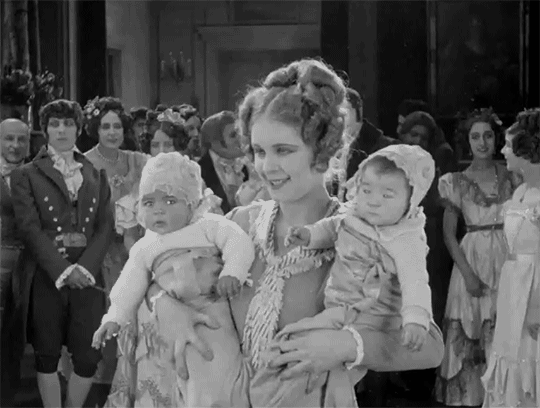


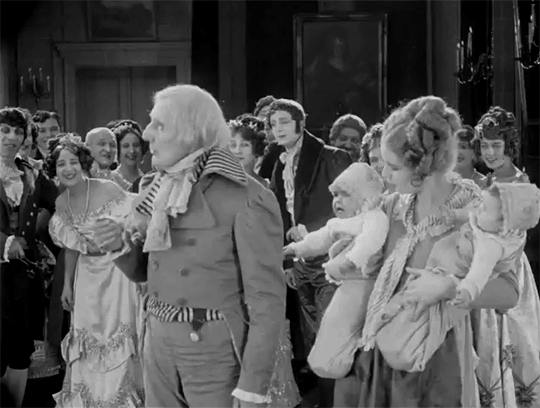

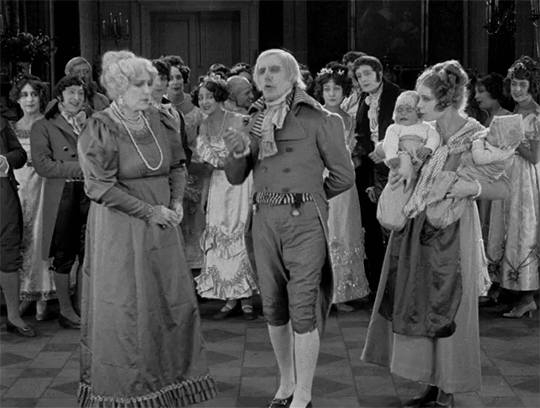



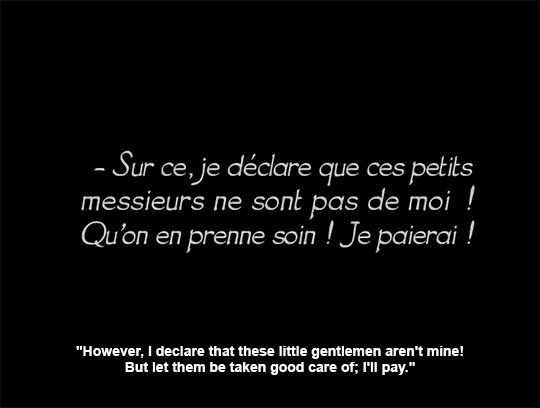
LES MIS LETTERS IN ADAPTATION - In Which Magnon and her Two Children are Seen, LM 3.2.6 (Les Miserables 1925)
One day, there was brought to him in a basket, as though it had been a basket of oysters, a stout, newly born boy, who was yelling like the deuce, and duly wrapped in swaddling-clothes, which a servant-maid, dismissed six months previously, attributed to him. M. Gillenormand had, at that time, fully completed his eighty-fourth year. Indignation and uproar in the establishment. And whom did that bold hussy think she could persuade to believe that? What audacity! What an abominable calumny! M. Gillenormand himself was not at all enraged. He gazed at the brat with the amiable smile of a good man who is flattered by the calumny, and said in an aside: “Well, what now? What’s the matter? You are finely taken aback, and really, you are excessively ignorant. M. le Duc d’Angoulême, the bastard of his Majesty Charles IX., married a silly jade of fifteen when he was eighty-five; M. Virginal, Marquis d’Alluye, brother to the Cardinal de Sourdis, Archbishop of Bordeaux, had, at the age of eighty-three, by the maid of Madame la Présidente Jacquin, a son, a real child of love, who became a Chevalier of Malta and a counsellor of state; one of the great men of this century, the Abbé Tabaraud, is the son of a man of eighty-seven. There is nothing out of the ordinary in these things. And then, the Bible! Upon that I declare that this little gentleman is none of mine. Let him be taken care of. It is not his fault.”
#Les Mis#Les Miserables#Gillenormand#Luc-Esprit Gillenormand#Les Mis Letters#Les Mis Letters in Adaptation#Les Mis 1925#Les Miserables 1925#Magnon#Mlle Gillenormand#lesmisedit#lesmiserablesedit#lesmiserables1925edit#silent film#filmedit#silentfilmedit#pureanonedits
28 notes
·
View notes
Note
Hello! I am very new to Les Miserables and I’ve heard a lot about Theodule but I never really understood Him as a character, why is he such a big deal?
Well tumblr ate a long reply that I had typed out because tumblr has a great UI /s
The truth is Theodule isn't important in the story, he doesn't show up much and he's just kinda superfluous. He's more like, decorative. He's a charming himbo who's a lancer in the army. He's Marius's cousin who flirted with Cosette for a while before she lost interest and he moved on
But the thing that elevates Theodule to great is how he was meant to be read vs how he reads. Hugo wrote the Gillenormand family in such a way that you're supposed to find them all equally sort of bad. Mlle Gillenormand (Marius's aunt) imo is the only one that fits the 'sort of bad' category because next to her we have an old man who beats his servants and who literally emotionally and physically abused his grandson, separating him from his father by threatening to disown him. And old G is supposedly redeemed in the end but no he isn't. He sucks and that never changes.
Marius also sucks (affectionate, but true. Sorry buddy, go to therapy please. And leave your grandpa's house) (anyway I think we're supposed to think that Marius overcame his flaws in the end, but no his worst flaws are very much still there)
But the things that Theodule has as character flaws are like almost all neutral things and/or not flaws at all? He cares about his appearance. He's kinda distracted. He sees that Cosette lost interest and he moves on with his life (that's supposed to be a flaw). He's just a charming young man, who grooms his mustache and loves his aunty and does what she tells him to do. But he's kind of inept at what she tells him to do.
One of the genuine best Theodule moments is when Marius has been disappearing for days at a time and his aunt tells him to spy on Marius. He does (but only cause he was headed that same direction anyway and he barely manages to do that cause he fell asleep) and finds out that unlike what the others thought, Marius doesn't have a secret girlfriend but is instead visiting his recently deceased father's grave. Theodule, being an army man, respects the colonel's resting place and also understands grief and so he leaves Marius alone and doesn't tell his aunt what he saw. But also partly cause he forgot to. And this makes him genuinely the best Gillenormand of all.
You know how in romcoms they will often give the female protagonist another love interest who's generally a nice guy and definitely better than the main love interest but then they make the character do something horrible to justify her leaving with the other guy? I think Theodule has that type of character vibe but Hugo forgot to make him do something horrible so he's just an army himbo who's hanging out. And Marius doesn't know him that well but he knows Marius so he's probably the nincest male friendship Marius has after the whole book is over and I want them to hang out more maybe Marius could learn a thing or two from him.
98 notes
·
View notes
Note
character opinion bingo!! mlle gillenormand, theodule, grantaire?
Thank you!
Mlle Gillenormand:

Theodule

Grantaire

1 note
·
View note
Text
Brickclub: 3.3.7
Theodule is a riot, I love him. And I’m already feeling sympathetic towards Mlle Gillenormand, so seeing her interact with someone who actually cares about her is so nice. Sure, Theodule is shallow and doing the thing where you go visit your elderly relatives out of duty and because there’s a non-zero chance that you’ll walk out with money, but he also seems to actually like her and enjoy the small doses of her company that he gets. It’s a pitch-perfect depiction of an inter-generational relationship between distant relatives.
We’re going to skip lightly over Hugo being Problems about elderly women, because we’ve talked about this kind of thing before and there’s only so many ways you can yell at him about it. Rest assured that I noticed and am not a fan.
So the power of coincidences strikes again, and Marius and Theodule take the same overnight carriage out of Paris. Theodule, despite his mission, doesn’t actually care what Marius is up to until he actually sees Marius behaving oddly in person. And when he does, he constructs an entire elaborate scenario in his head for what’s going on, which holds right up until he sees the final piece and realizes, oh, it’s not that at all. That final image of Marius sobbing alone over the gravestone is heartbreaking, and clearly not something Theodule has any idea what to do with at all. Theodule is almost certainly the epitome of that gif where the crying person is being stroked with a broom in an attempt at comfort. Feelings don’t really seem like his strong point, and they’re pretty much all Marius has at this point.
(Sidenote: the Mlle Gillenormand/Petunia Dursley parallels are super strong in this one, which I headcanon as being why she’s not a huge fan of Marius. Too much of a reminder of how her sister got everything she wanted, while Mlle Gillenormand herself got none of her dreams. Mlle Gillenormand the younger not only married the man of her dreams and had a child, she got to escape the house, while the elder didn’t marry anyone at all and is stuck with their father all her life. It’s not great to take out your bitterness on a child, but it doesn’t seem like she’s actually Dursley-level abusive towards him or anything. Just bitter and willing to let it out in front of the only relative she actually likes.)
#brickclub#3.3.7#this fcking book though#i am having a surprising number of emotions about mlle gillenormand#all the elderly virgins in this book should get together and start a book club or something#baptistine and mlle gillenormand and simplice and maybe marguerite too if she wants
11 notes
·
View notes
Text
Does anyone know good sources for finding which baby names were popular in certain years? Most sites I’ve found in my own cursory search only go as far back as 1900, which is... Not Old Enough
#not quite liveblogging my life#fanfic#i'm thinking about using Nathalie for Mlle Vaubois; Aunt Gillenormand's chapel friend; but i have NO idea if it fits the time period#in hugo's defense he DID put a lot of thought into names if it was a set up for a pun#is a tag i have used
5 notes
·
View notes
Text
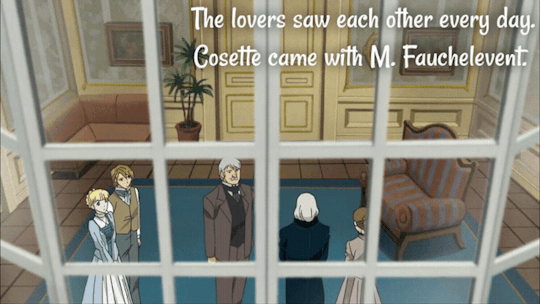



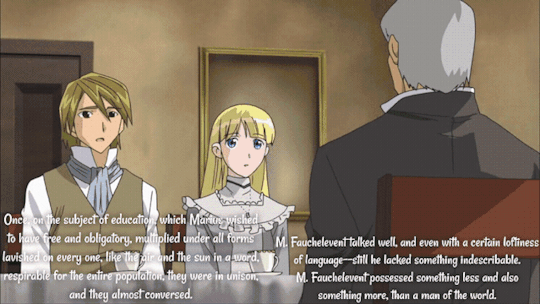
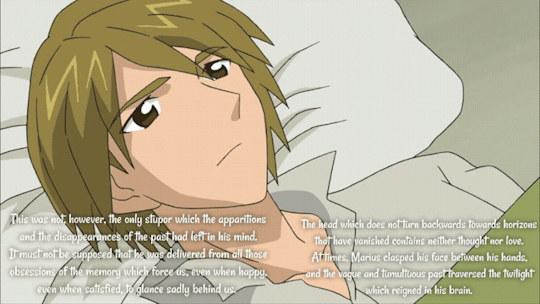


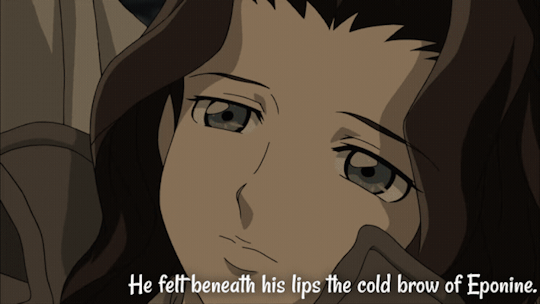
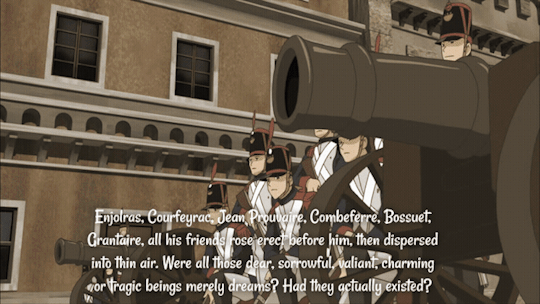
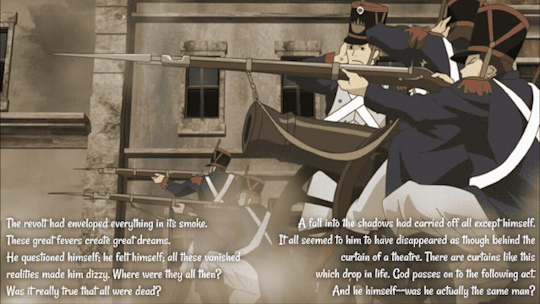

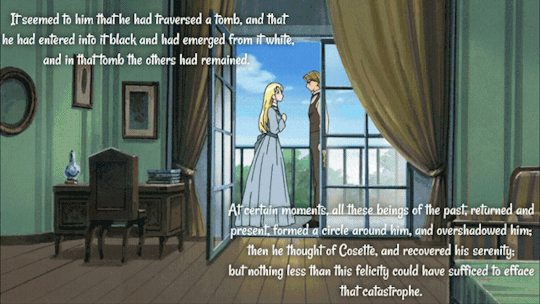
The Effects of Dreams Mingled with Happiness(And the status of the Marius' mind), Volume 5, Book 5, Chapter 7.
Clips from <Il cuore di Cosette>.
#Les miserables#les mis#My Post#Marius#Cosette#The Lark#Mlle. Ursule#Lark and Booby#Jean Valjean#M. Leblanc#Father and daughter#Owl and Wren#Mlle. Gillenormand#Mabeuf#Gavroche#Little People#Eponine#Love Triangle#A Little Fall of Rain#National Guards#Les amis#The Barricade#Cosette's Wedding#Tw:PTSD#Empty Chairs at Empty Table#Though he may look like a booby and being happy. Think this again.#He was also the survivor of the state violence and the trauma.#(Including the child abuse of course. But not appeared on this chapter.)#Il cuore di Cosette#Les Mis Letters
19 notes
·
View notes
Text
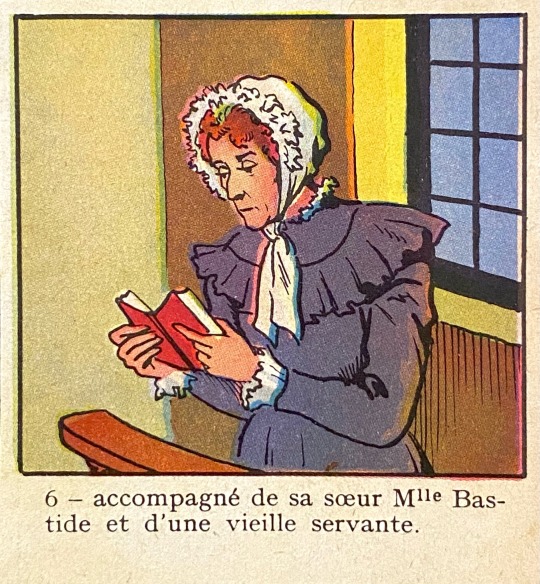


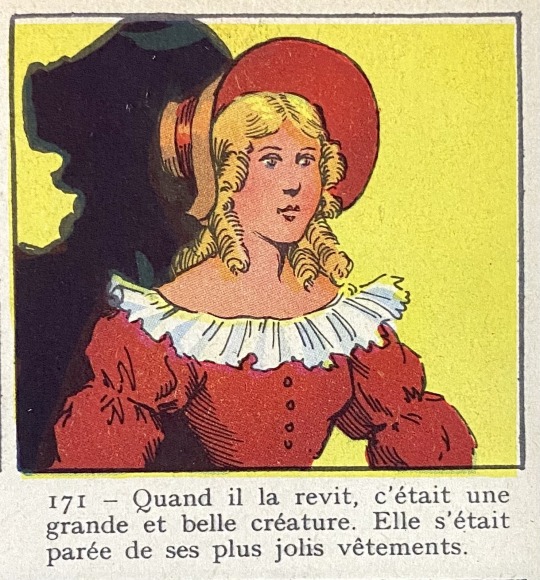
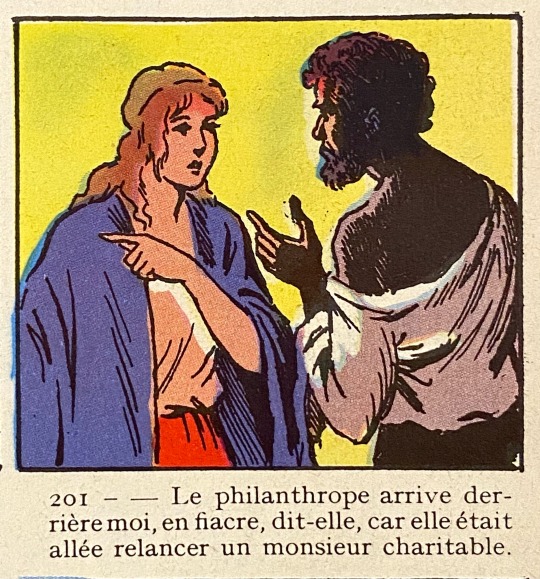

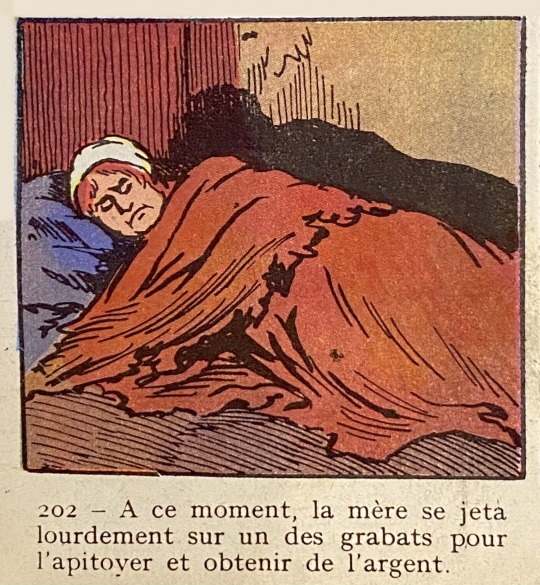
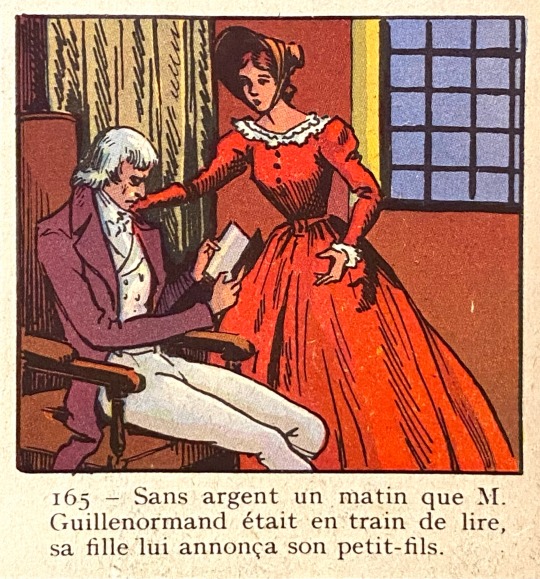
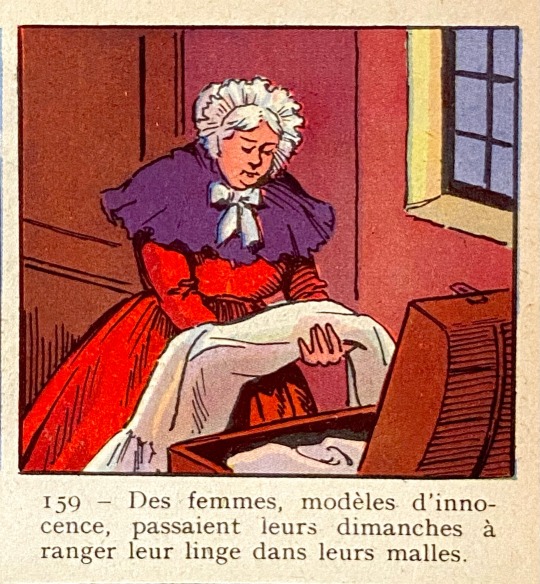
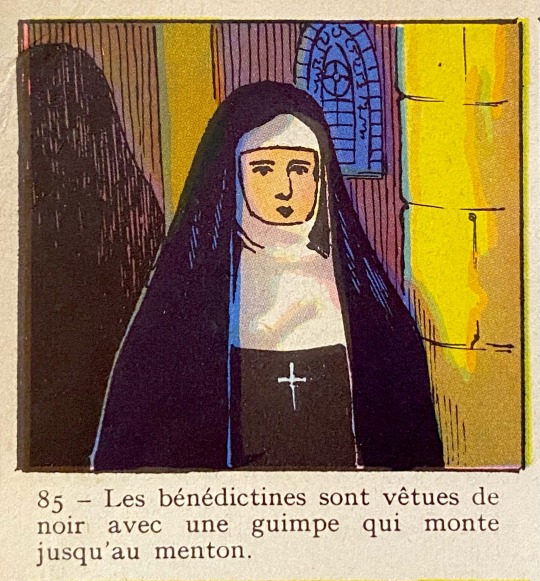
Les Misérables, French Comic by Houy Raymond (1953)
I love how the women look in this comic so much.
#les miserables#les mis#baptistine#sister simplice#fantine#cosette#eponine#azelma#madame thenardier#mlle gillenormand#Raymond comic#comics
34 notes
·
View notes
Text
Brickclub 3.2.8 ‘Two do not make a pair’
Ugh. I want to just skip this chapter. Instead, I’m going to rant at it.
We’re shown two sisters, one of whom is portrayed as romanticism and idealism personified, and the other is a boring and unintelligent prude, and WHY? Marius’s mother does indeed sound delightful! Would love to hear more about her some time! Why do we need to denigrate her half-sister in order to tell that story?
Fuck everything.
I’d have more say about how horrible the portrayal of Mlle Gillenormand is, but I’ve said it before. There’s a subtle and realistic characterization here in terms of how complex her sexual repression is. There’s a fear and horror and obsession in her uptightness that’s not mere indifference to sex--it’s very perceptively drawn! And there’s a really interesting observation about how her innocence makes her unaware of how she reacts to her handsome young grandnephew.
BUT, when it comes time to explain what’s going on with her, Hugo is just, like, “Lol, stupid prude.” Because she’s a woman, because she’s not charismatic, because she isn’t naturally inclined to the romanticism that’s the hallmark of positive characters in this book, she’s the butt of the narrative’s jokes. He’s been balanced and compassionate about her father, despite his many sins, which--fine! I’m not against compassion and nuance! But why is she the one whom suddenly the narrative has no patience for?
Fuck that. Nobody needs to be charming to deserve being treated with dignity and compassion, and I thought this book understood that better.
And it’s really unfortunate, because if you strip away Hugo’s awful way of talking about her, he’s drawn someone that really makes sense in these circumstances. It really feels like her stifledness and dissatisfaction and clinging to religion were created in the shadow of her father’s overbearingness, charisma, bullying, and libertinism. It’s telling that the two kids raised by Gillenormand are sexually repressed and socially anxious and generally weird!
But Marius’s issues get dealt with compassionately because he’s 1) male, 2) a Romantic, and 3) the author’s darling. And Mlle Gillenormand’s get talked about like her issues are her fault. Her fantasy as a kid was to marry someone stable and steady and boring, and HEY, MAYBE THERE WAS A REASON FOR THAT? Yeah, she’s got lots of unexamined issues about class. LET’S GET HER OUT OF THIS AWFUL HOUSE AND WORRY ABOUT THAT AFTER.
WHY must Hugo take women not having sex as an affront to him personally?
And fuck, it’s not even mentioned in this chapter how she’s fifty and her father still beats her. Not that there’s, like, an age where that’s okay, but there’s something extra awful about it, both from a dignity perspective and an injuries perspective.
And the word “prude” is so horrible. And it’s such a horrible thing to level at her. And it’s bizarre that it’s JUST at her, in a book with this many celibate characters? What she chooses to do or not do in terms of sex is none of the narrator’s damn business to make moral judgments on! I had Enjolras use the word “prude” against himself in a fic one time because the way it’s used here against one of the least powerful and least charismatic characters in this novel is fucking unfair.
And in the middle of all this, Hugo drops:
No ambition is fully realized, here below at least. No paradise becomes terrestrial at the period in which we live.
Which is extremely important to the structure of this book! This explains so much about why the barricade and the ending are what they are! And also I’m too mad at him to explore any of it right now!
49 notes
·
View notes
Text
The abusive old man is back! Marius is so desperate that he has to beg his grandfather to allow him to marry (since, according to the French laws, he was considered a minor until 25). It’s so strange to revisit this family. I have just realized how hard it must have been for M. Gillenormand to live doing opposite to what he felt like doing when it came to his grandson.
It seems like Hugo has a strange kind of sympathy for his morally flawed characters. After all, the horrid Thénardier and the awful Gillenormand are among the rare survivors at the end of the Brick. What was he trying to convey with this?
But I was actually glad to meet Mlle Gillenormand again. She tried to be helpful by introducing Théodule as a replacement for Marius (while also showing some sympathy towards Marius), but failed. I was also delighted to encounter the ridiculous Théodule again! It’s interesting that M. Gillenormand despised him, even though Théodule shared many traits with him: frivolous, vulgar, and a womanizer… But, of course, he is not Marius.
It’s kind of funny, how M. Gillenormand misunderstood Marius’ (un)involvement in the Revolution of 1830! And it was so unexpected that Marius finally gave in to his feelings and sincerely told his cynical grandfather about his deep love for Cosette. But M. Gillenormand is just being himself. He turned everything into a joke and suggested that his grandson take Cosette as a mistress. It was the last straw. And here, I feel solidarity with Marius. (However, let's be honest - marriage is not a good solution in Marius' situation: he has no job, no money, he still "sleeps with" Courfeyrac, he owes money.)
Meanwhile, it’s already the 4th of June.
#les mis letters#lm 4.8.7#les miserables#marius pontmercy#gillenormand#cosette#theodule#mlle gillenormand
23 notes
·
View notes
Text
Although Théodule’s decision not to say anything about Marius’ visits reflects his obedience to a different authority (the “discipline” of the military), it also highlights continuities between old and new orders. His respect for death may be religious or spiritual, but his respect for Georges Pontmercy as a colonel and his desire to salute him stems more from his own military rank. He’s likely a royalist if he cares about politics at all because of his family, but he also feels connected to Marius’ father as a soldier. The government may have changed, but the French army is, in some ways, the same, and for him at that moment, that tie took precedence.
It’s also fitting that M Gillenormand’s curiosity is what actually harms Marius. Mlle Gillenormand doesn’t have a lot of power in the household, and Théodule really couldn’t care less what happens there. M Gillenormand has all the authority here, so his opinions are what determines Marius’ security. Mme Victurnien and the woman from the Gorbeau House were either in a place of authority (as the one watching over the house) or could report to one (like Mme Victurnien did); Mlle Gillenormand could have behaved like Victurnien, but she would have risked M Gillenormand’s rage, not been praised by society for revealing a scandal (especially given M Gillenormand’s reverence of Marius).
He’s so dramatic about it, too, using his assumptions as another opportunity to boast of his past affairs and making sure he does so with an audience (his daughter):
““For this evidently is a portrait. I know all about such things. That is worn tenderly on the heart. How stupid they are! Some abominable fright that will make us shudder, probably! Young men have such bad taste nowadays!””
As distressing as this chapter is - Marius has been cast out of his home for his political beliefs - it still has some humor because Marius is a bit of a disaster. The fact that his calling cards were what definitively exposed him is a little embarrassing, and his confusion over which king to denounce is hilarious (he has the spirit! He’s just catching up to the present in his reading).
That being said, this is a really tragic outcome. Being away from Gillenormand can only be good for Marius, but having to leave with nothing is horrible (especially given that his father sacrificed his time with him to guarantee his financial security! Which he now lacks). Mlle Gillenormand’s treatment worsens, too. M Gillenormand’s absolutism (both in terms of his politics and his attitude toward people who disagree with him) shattered whatever semblance of care they all had for each other.
#les mis letters#lm 3.3.8#marius pontmercy#mlle gillenormand#m gillenormand#théodule gillenormand#I feel bad for Marius but his awkwardness is what keeps me going through his sad chapters#unfortunately for him
26 notes
·
View notes
Text
Cosette’s Timeline
Born in Paris in the spring of 1816, probably around mid-March. (1.4.1, calculations here)
Age ~15 months: Her father abandons her mother (early summer 1817, 1.3.3)
Age 2: Her mother leaves Cosette with the Thénardiers (~April 1818, 1.4.1). Cosette goes immediately from wearing fine clothes made by her mother to wearing rags.
Age 4-5: The Thénardiers keep Cosette inadequately dressed for the cold, and start treating her as a servant when her mother falls behind on payments (winter 1820, 1.4.3/1.5.10)
During her time at the inn (age 2-almost 8), Cosette befriends the Thénardier’s dog. She is regularly beaten by Mme Thénardier. Cosette sleeps under the stairs in the kitchen, wears rags, and is fed scraps. Her work includes dusting, washing, sweeping, fetching and carrying, buying food, watering guests’ horses, getting water when the water-carrier is off work (ie, at night), and knitting. Her only toy is a lead sword and some rags. [2.3.2-2.3.8]
Age 7: Her mother dies shortly after Cosette’s 7th birthday (after March 25, 1823; 1.8.2, 1.8.4, 2.4.2). Cosette learns this 9 months later, on Christmas Eve. That same night, a stranger carries her water bucket from the woods for her, gets her a night off work, and gives her a beautiful doll. The next day, she finds a gold coin in her shoe, and her new adoptive father gives her new clothes and takes her away to Paris (2.3.7-2.3.11).
Age 8: Living in Paris, Cosette plays. Her father takes her for walks, and teaches her to read. Around the time of her 8th birthday (March 1824), they flee the apartment where they’ve been living and enter the Petit Picpus Convent. (2.5.10)
Age 8-13: Cosette attends the convent boarding school as a charity student. She visits her father and ‘uncle’ for an hour each day. In addition to religion, the curriculum includes music, history, housekeeping, and possibly drawing (2.6.4, 2.6.7, 2.8.9).
Age 13: Cosette and her father leave the convent (between April and Ocotober 1829), following the death of her uncle. That autumn, they move into a House on the Rue Plumet, and take on a servant, Toussaint. (4.3.1, 4.3.4)
Age 14: Cosette and her father take walks in the Luxembourg Garden, and are nicknamed “M Leblanc” and “Mlle Lanoire” by the students. (3.6.1) Cosette cajoles her father into having white bread and a fire in his rooms by insisting that she share his deprivations. (4.3.4).
Age 15: Cosette becomes/discovers she is pretty, and gets interested in fashion, and in a dreamy student she sees in the Luxembourg (4.3.5-7). In October 1831, Cosette and her father encounter the chain gang near the Barriere du Main. (4.3.8) On February 3, 1832, some 6 weeks before her 16th birthday, Cosette and her father take clothes to a poor family in the Gorbeau Tenement; returning to pay their rent, her father is wounded and develops a fever. Cosette nurses him for a month until he recovers. (4.4.1)
Age 16: Cosette has a crush on a handsome lieutenant (Théodule Gillenormand) for about a week in April 1832. This ends when she receives Marius’s love manifesto in the third week of April (4.5.1-4.5.3, 4.5.6). Cosette and Marius continue to meet in the garden each evening from the end of April until early June. (4.8.2) On June 3, Cosette tells Marius that her father plans to take her to England soon, and he headbutts a tree for two hours while she cries. Marius leaves her his address and they agree to meet again on the 5th (4.8.6). Cosette’s father decides to move residences late on the 4th, and Cosette writes to Marius with her updated address, giving the note to a disguised Éponine (4.9.1, 4.12.7). JVJ, Cosette, and Toussaint remove to the apartment on the Rue de l’Homme Armé that evening. (4.12.7) Cosette stays in her room all day on June 5th, and eats no dinner, claiming to have a headache (4.15.1). She wakes at dawn on the 6th, hoping/expecting to hear from Marius (5.1.10). As his note was intercepted by Cosette’s father, it’s unclear when and how she found out about Marius’s injury and removal to the Gillenormand household, but over the summer she sends lint and bandages and inquires after his health. Between September and December, Cosette begins visiting Marius and they become engaged. She also finds out that she has a substantial fortune (5.5.2, 5.5.4, 5.5.6)
Age 17: Cosette marries Marius on February 16, 1833, a few weeks before her 17th birthday. (5.6.2) She and Toussaint move into the Gillenormand house, but her father resists joining them. He visits daily from February 18th to late April, but begins treating Cosette more formally and staying for less time, while she tries to make him comfortable with chairs and a lit fire. (5.7.1, 5.8.1-2) He stops coming to see her in May (5.9.1-2). In early June, Marius discovers that Cosette’s father saved him the previous summer, and the two rush to her father’s deathbed. (5.9.5)
#saving for future reference#Cosette Week#For A Lark#lark rising#applying the forbidden magic of math#Les Miserables
142 notes
·
View notes